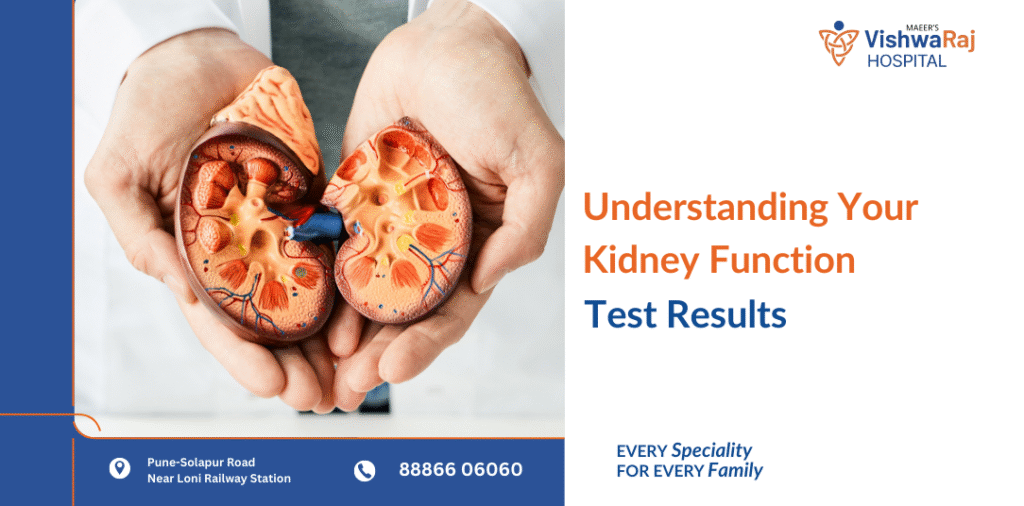Ever received your blood test report and felt lost in a sea of numbers like creatinine or eGFR? If so, you’re certainly not alone. Kidney function tests can look intimidating, but they’re some of the most important tools for keeping tabs on your overall health. At VishwaRaj Hospital, Best Multispecialty Hospital in Pune we meet people every day who want clear, simple explanations—so let’s break down what your kidney test results really mean, why these tests matter, and how to take the next steps with confidence.
Why Kidney Function Tests Are Important
Most of us don’t think about our kidneys until something goes wrong, but these small organs play a huge role in keeping your body running smoothly. Kidneys filter out toxins, balance fluids, regulate blood pressure, and help keep your bones and blood healthy. The problem? Kidney disease often develops quietly. You might not have symptoms until there’s already significant damage.
Routine kidney testing is crucial, especially if you have diabetes, high blood pressure, a family history of kidney disease, or if you’re over age 60. Early detection lets you act before minor issues become serious problems.
At VishwaRaj Hospital in Pune, we emphasize preventive screening and patient education—because knowledge really is power when it comes to your kidneys. As a trusted kidney transplant hospital in Pune, we’re committed to providing comprehensive care, from early detection to advanced treatment options.
Types of Kidney Function Tests

So, what’s in a typical kidney function panel? While the names might sound technical, each test offers important clues about how well your kidneys are working.
Serum creatinine is a byproduct of muscle metabolism, and healthy kidneys clear it from your blood. If your creatinine is high, it may mean your kidneys are struggling. Blood Urea Nitrogen (BUN) is another measure—this waste product comes from protein breakdown. BUN can go up with kidney dysfunction but is also affected by things like dehydration, diet, or even certain medications.
Estimated Glomerular Filtration Rate (eGFR) is a calculated value that estimates how well your kidneys filter waste. It’s considered the gold standard for measuring overall kidney health. Urinalysis checks for protein, blood, or other abnormalities in your urine—these can be among the first warning signs of kidney problems, even before you notice any symptoms yourself.
Lastly, the albumin-to-creatinine ratio (ACR) is a urine test that checks for small amounts of protein leaking into your urine. This can reveal early kidney damage, especially for people with diabetes or hypertension.
Doctors often use a combination of these tests to get the full picture, and if you have risk factors or symptoms, you may need them checked more frequently.
Normal Ranges and What They Mean
Understanding your results starts with knowing the typical “normal” values. For most adults:
- Serum Creatinine:
- Men: 0.7–1.3 mg/dL
- Women: 0.6–1.1 mg/dL
- BUN:7–20 mg/dL
- eGFR:Above 90 is considered normal; above 60 is generally okay depending on age and other health factors.
- Albumin-to-Creatinine Ratio (ACR):Under 30 mg/g is healthy.
It’s important to remember that these numbers are general guidelines. Things like age, muscle mass, recent exercise, or even what you had for dinner the night before can impact your results. That’s why at VishwaRaj Hospital, a well-known hospital in Pune we always interpret lab values in the context of your personal health story—one size never fits all.
Results within these ranges usually mean your kidneys are doing well. But what if something is a little off? Trends over time are key. Your doctor will look at changes in your results, not just a single number.
Common Abnormal Results and Their Causes
A flagged result on your report can be unnerving, but not all abnormal kidney tests mean you’re in trouble. For example, a slightly elevated creatinine could simply be from dehydration, a hard workout, or even eating a protein-heavy meal the night before.
Persistent high creatinine or BUN, especially if paired with a low eGFR, can signal chronic kidney disease, which may result from long-term conditions like diabetes, high blood pressure, or certain medications. But there are other explanations, too—temporary illnesses, heart problems, or urinary tract blockages can all throw your kidney tests out of whack.
Finding protein or blood in the urine might sound scary, but it’s not always serious. Sometimes it’s from a mild infection, strenuous exercise, or (for women) even menstruation.
The real key is not to panic after a single abnormal result. At VishwaRaj Multispecialty Hospital in Pune, we recommend a step-by-step approach: often, your doctor will repeat the test, look for patterns, and review your overall health before making any diagnosis. You’re not just a number on a lab sheet.
When to Be Concerned About Test Results
So when should you worry? If your eGFR is consistently below 60, or your creatinine and BUN stay elevated on repeat tests, that’s worth a closer look. Chronic kidney disease is typically staged by how low your eGFR drops, and whether there’s protein in your urine.
Other red flags include swelling in your ankles or face, feeling tired all the time, trouble urinating, or high blood pressure that’s hard to control. If you have a history of diabetes, hypertension, or kidney problems in your family, it’s important to keep a closer eye on your labs and overall health.
But don’t jump to conclusions. Sometimes, an abnormal test is just a blip. Repeat testing, reviewing your medications and lifestyle, and looking at your broader health history all matter when deciding what steps to take.
At VishwaRaj Hospital, we believe early attention to small changes can prevent bigger issues later. If there’s any doubt, it’s always better to ask for help than to wait and worry.
Next Steps After Abnormal Results
If your kidney test results aren’t in the “normal” zone, what happens next? First, try not to panic. Most often, your doctor will repeat the test, especially if you’ve been ill, recently dehydrated, or started new medication.
After confirming the results, your doctor will review your medicines, check for underlying conditions like diabetes or high blood pressure, and sometimes order further testing or imaging.
If there are ongoing concerns, a referral to a kidney specialist—called a nephrologist—may be in order. At VishwaRaj Hospital in Pune, our nephrology experts can guide you through more advanced tests or help you develop a kidney-friendly lifestyle plan. Most early kidney problems can be managed with simple changes: keeping blood sugar and blood pressure in check, staying hydrated, cutting down on salt, and avoiding certain painkillers.
Remember, a single abnormal value isn’t the whole story. We focus on long-term patterns, your symptoms, and risk factors to decide if and how to intervene.
FAQs
They measure how well your kidneys filter waste—primarily through creatinine, BUN, eGFR, and sometimes urine protein.
Every 1–2 years if you’re healthy, but more often if you have risk factors like diabetes, high blood pressure, or a family history of kidney disease.
Over 90 is ideal, and above 60 is usually okay for most adults.
Absolutely—hydration, recent exercise, or even a high-protein meal can affect your numbers.
It could mean decreased kidney function, but sometimes it’s related to temporary issues like dehydration.
“Kidney function test” gets about 18,000–22,000 searches monthly worldwide. FAQs like “normal kidney test range” and “eGFR meaning” are searched thousands of times per month.
This blog is reviewed by the expert nephrology team at VishwaRaj Hospital. For personalized guidance, always consult your healthcare provider.




